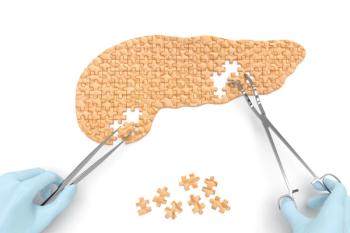
Safety, Efficacy of Immune-Checkpoint Inhibitors in Patients With NSCLC And Chronic Hepatitis B
Immune-checkpoint inhibitors were comparably safe and effective in patients with chronic hepatitis B or occult hepatitis B infection.
Immune-checkpoint inhibitors are both safe and effective in patients with non–small cell lung cancer and chronic hepatitis B or occult hepatitis B infection, according to research presented at the 2023 American Society of Clinical Oncology Annual Meeting.1
Investigators conducted a real-world cohort study to analyze the incidence of hepatitis B virus reactivation, immune-related hepatitis and jaundice in patients with non–small cell lung cancer treated with immune-checkpoint inhibitors. Data was gathered from the Samsung Medical Center in Seoul, South.
The study cohort included 1277 patients who were treated with immune-checkpoint inhibitors from January 2015, through December 2020. Of the included patients, 52 were hepatitis B surface antigen (HBsAg) positive, 759 were HBsAg negative or anti–hepatitis B core antigen (HBc) IgG positive, and 466 were HBsAg negative or anti-HBc IgG negative. Among the 52 patients with chronic hepatitis B, 38 received antiviral therapy.
The study’s primary end point was hepatitis B virus reactivation, immune-related hepatitis, and jaundice. Secondary end points included other immune-related adverse events, objective response rate, progression-free survival, and overall survival.
Investigators found that hepatitis B virus reactivation was observed in 2 patients in the HBsAg-positive group. Incidence of immune-related hepatitis was 21.2% in the HBsAg-positive group, 30.3% in the HBsAg negative or anti-HBc IgG positive group, and 30.5% in the HBsAg negative or anti-HBc IgG negative group. Immune-related jaundice occurred in 3.8%, 4.0%, and 2.8% of the groups, respectively.
Additionally, the incidence of immune-related adverse events, objective response rate, progression-free survival, and overall survival among the 3 groups was comparable.
“In this large, real-world cohort study, safety and efficacy of immune-checkpoint inhibitors were comparable in patients with chronic hepatitis B or occult hepatitis B infection, suggesting similar outcomes can be expected with immune-checkpoint inhibitors in patients with chronic hepatitis or occult hepatitis B infection,” the authors concluded. “Hepatitis B virus reactivation was observed in patients with chronic hepatitis B without antiviral therapy indicating antiviral prophylaxis might be required for them.”
Reference
1. Hong J, Lee J, Park S, et al. Immune checkpoint inhibitors use and the incidence of hepatitis B virus reactivation or immune-related hepatitis in non-small cell lung cancer patients with chronic hepatitis B. J Clin Oncol. 2023;41(suppl 16; abstr 9086):9086-9086. doi:10.1200/JCO.2023.41.16_suppl.9086.
Newsletter
Pharmacy practice is always changing. Stay ahead of the curve with the Drug Topics newsletter and get the latest drug information, industry trends, and patient care tips.























